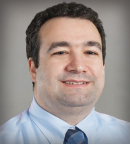DREAMM-7, which evaluated belantamab mafodotin-blmf, bortezomib, and dexamethasone (BVd) in relapsed or refractory multiple myeloma, was discussed at the virtual session by Rachid Baz, MD, Myeloma Section Head and Co-Director of the Pentecost Family Myeloma Research Center at Moffitt Cancer Center, Tampa, Florida. “The DREAMM-7 trial results are compelling and support the clinical efficacy of belantamab mafodotin for patients with relapsed or refractory multiple myeloma,” he said.
Essentially, DREAMM-7 “checks most of the boxes,” according to Dr. Baz. The study met its primary endpoint. The overall survival data looked “very favorable,” despite a low number of events. There was no unexpected toxicity, and patient-reported outcomes were no worse than the comparator’s. The BVd regimen can be administered outside large academic centers with specialized care for the management of patients with cytokine-release syndrome, which is common with other B-cell maturation antigen (BCMA)-directed therapies, he noted.

Rachid Baz, MD
Questions About Sequencing of Therapies
“However,” Dr. Baz continued, “the 26% discontinuation rate due to adverse events is a little higher than we would see with other regimens, and there are questions about the sequencing of therapy with other BCMA-directed therapies. It would be important to have data on the outcomes of the patients given BVd who receive subsequent BMCA-directed chimeric antigen receptor [CAR] T-cell or T-cell engager therapies.”
With the number of BCMA-targeted therapies growing, the question of sequencing is important, Dr. Baz emphasized. For example, where would BVd fit if CAR T-cell therapy or BCMA-targeted bispecific antibodies are approved in an earlier line? And how does prior exposure to belantamab mafodotin impact future response to these other BCMA-targeting treatments, which now also include the T-cell engagers teclistamab-cqyv and elranatamab-bcmm?
“Treatment considerations for patients with relapsed or refractory myeloma include efficacy, tolerability, and access to care,” said Dr. Baz, and BVd succeeds on these fronts, he added. “The major upside is you can administer it in the community, where a lot of patients don’t have access to a large cancer center or academic center.”
DISCLOSURE: Dr. Baz reported financial relationships with Hikma Pharmaceuticals, Bristol Myers Squibb, Sanofi, Janssen, Pfizer, and GlaxoSmithKline; and has received institutional research funding from AbbVie and Regeneron.

